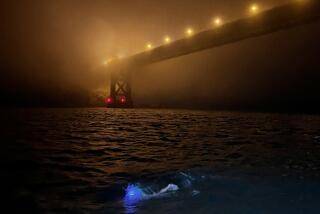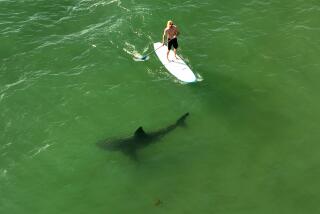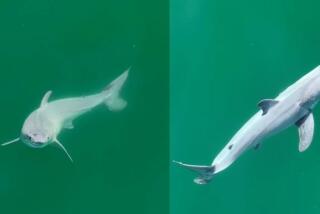Discovery Shark Week still swimming, not sinking
After a quarter-century of dorsal fins and drinking games, Shark Week remains a strange and celebrated event. The annual Discovery Channel lineup, which kicks off again Aug. 12, snared more than 26 million viewers last summer.
The tradition began in 1988, when Discovery aired a week’s worth of shark-oriented programming in hopes of drawing audiences on a slow summer week. It worked: According to Brooke Runnette, the network’s executive producer for special projects, the series’ 1988 premiere doubled Discovery’s prime-time average, launching a 24-year streak of increasingly high yearly ratings.
How did educational programming, devoid of sex appeal or furry LOLcats, become a full-blown pop-culture sensation?
“Besides the fact that sharks are just awesome?” asked Runnette, who planned the 25th Shark Week specials. “We don’t do Grizzly Week, we don’t do Lion Week — it’s that sharks are profoundly mysterious and profoundly powerful creatures. They put us in our place on the food chain. That makes them endlessly fascinating.”
Maybe it’s because society is in awe of the monstrous — from Dracula to Jaws, powerful, scary things have long dominated family movie nights and casual conversation. Shark Week trends on Twitter for days; Runnette said loyal fans upload images of cupcakes with candy teeth, living rooms decorated in “Jaws” theme, babies in shark garb.
But Shark Week doesn’t strive to glorify shark attacks, which periodically make headlines along the coasts in hotter months. Against conventional reality television wisdom, Runnette said, the shows frame sea predators realistically, with great caution. Experts lace safety tips throughout each episode.
“Sharks are rational actors,” Runnette said. “They’re predictable. We aim to teach viewers about their habits and patterns. Sharks never just go out and intentionally hunt humans.”
Sal Jorgensen, a marine biologist at the Monterey Bay Aquarium, teamed up with Discovery producers to shoot “Great White Highway” — a program that explores movement patterns of the marine beasts, based on his research. (Spoiler: The Great Whites tagged by Jorgensen return to the same areas of the ocean year after year.)
“My hope is the programming will help the public develop a better understanding of sharks,” he said. “They’re not the wandering rogues we seem to think they are. If we know where they’re going to be at specific times, we can better avoid human-shark interactions.”
The overall quality of Shark Week keeps improving, Jorgensen said, adding he probably wouldn’t have signed on in the series’ early years.
“It rose to prominence using this formula of sensationalism about sharks and danger, playing on the fear of shark attacks,” he said. “That got a lot of views, but it didn’t send the correct message.”
Shark Week was born a marketing tool. As cable became a household staple in the late ‘80s, producers wondered: How can we get people to notice the Discovery Channel? More than 140 shark programs later, Shark Week promotes shark conservation, highlighting plights of the creatures Jorgensen called “misunderstood.”
But subdued sensationalism doesn’t mean viewers won’t tune in to close-ups of gleaming, jagged teeth — now captured by high-speed cameras.
Alongside titles like “Air Jaws Apocalypse” and “Shark Fight” (to name two of nine), Discovery Channel’s 25th edition of Shark Week features a bus-sized shark skeleton unearthed in Bakersfield. “Sharkzilla,” as it’s dubbed, rested near the bones of a decapitated whale, and “MythBusters” co-host Kari Byron aims to answer, “What actually happened there?”
“It really hit home for me when I got to hold a tooth that was bigger than my hand,” said Byron, who is no stranger to shark jaws. While shooting Discovery Channel programs, she fears real-life encounters.
“We went diving at night to see if sharks are attracted to flashlights,” she said. “I was just terrified, my heart was pounding — and a sea turtle or something suddenly brushed behind me. I screamed so loudly into my mask.” And though her wet suit was shark-resistant — “The teeth just slide off!” — a shark bite would leave a mean bruise, Byron said. “I have both fear and respect for them.”
Natalie Escobedo, 26, of North Hollywood, grew up watching Shark Week with her father. Now, she plans annual viewing parties and sports a 6-inch red shark tattoo on her forearm. “I know it sounds crazy, but sharks are my spirit animal,” said Escobedo, who bought a little blue fin for her Shih Tzu, Sophia. “Shark Week is like a holiday to me now.”
This year, she plans to watch opening night with her friends in Los Feliz and finish the series at her childhood home in Chicago. “What’s a better reunion than that?” she said. “Me and my family, watching awesome sharks for hours together. Best time ever.”
More to Read
The complete guide to home viewing
Get Screen Gab for everything about the TV shows and streaming movies everyone’s talking about.
You may occasionally receive promotional content from the Los Angeles Times.






